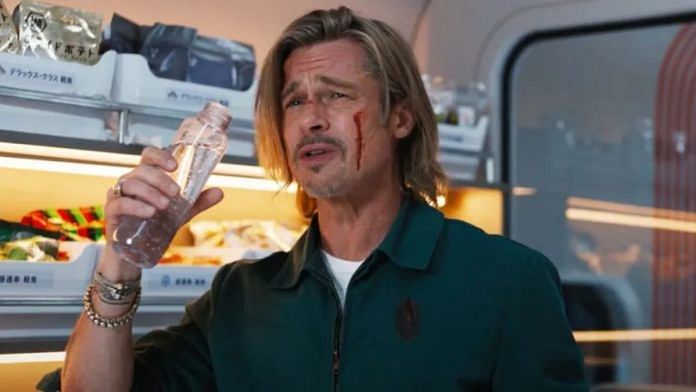Set in Tokyo at the outset, the action-comedy film Bullet Train begins in a manner that is perhaps now stereotypical of action films made by Westerners gazing eastwards. We see Andrew Koji play Yuichi Kimura, a Japanese man in his thirties, engage in a critical conversation with his seemingly wiser father—essayed by Hiroyuki Sanada of Rush Hour 3—and seek revenge against the individual who attempted to kill his nine-year-old son by pushing him off a terrace. As Yuichi ambles towards the meeting point with the culprit, who is aboard a Bullet Train bound for Kyoto, he brushes past Brad Pitt’s character, Ladybug, at Tokyo station, foreshadowing how the two—and the rest of the cast—will cross paths again over the course of the film.
‘Bullet Train’ subverts clichés
On paper, this sounds like a cliché-ridden premise–because it is. But, nearly a decade into his mainstream blockbuster career, director David Leitch is no stranger to embracing and subverting clichés in the genre. After co-helming the seminal Keanu Reeves—starrer John Wick with Chad Stahelski in 2014, Leitch offered a worthy follow up with Charlize Theron in Atomic Blonde, before pivoting from highly choreographed action films to comedy sequels in Deadpool 2 and Hobbs & Shaw. Fortunately, Bullet Train is Leitch’s best work since the pivot as he once again makes clichés look cool and well-timed, starting with a Japanese cover of Bee Gees’ Stayin Alive and numerous references to a children’s cartoon that prove to be important to the plot.
Unlike his previous works, Bullet Train‘s fight scenes and violence aren’t as memorable, the computer-generated imagery is questionable at best and the runtime is at least ten minutes too long, almost as if budget and directorial ambitions didn’t completely match. But Leitch and company inject a million more bells and whistles to prevent the film from being a slog. He is helped massively by a cast that is firing on all cylinders and a screenplay that, despite its changes to many characters’ nationalities, retains the broad story strokes, darkly humorous spirit and Japanese setting in a way that Kung Fu Panda did by putting a bunch of Americans in China.
Also read: Netflix’s The Gray Man is a fun action ride, but has nothing new to offer
Brilliant dialogues, subplot
By far, the strongest elements of this screenplay are shown in the dialogues, made even funnier by the instantly infectious chemistry between the ensemble. Brad Pitt does well as a professional thief named Ladybug who tries to eschew violence through his newfound zen mentality and therapy. But Aaron Taylor Johnson and Brian Tyree Henry bring the funniest moments, as they play Tangerine and Lemon, a duo of Cockney accented hitmen with a shared love of West Ham United. Henry’s Lemon, in particular, makes the most of his character arc as it is built on a devotion to Thomas the Tank Engine, an unexpectedly brilliant subplot that was adapted faithfully from the novel.
The fate-focused emotional core of the film, which revolves around Yuichi and his father, is weak from a writing perspective but Koji and Sanada put in excellent performances, far more convincing in dramatic acting than their Western counterparts.
This arc aside, however, Leitch and company never take things too seriously. Flashbacks and dodgy Russian accents appear to be delivered with tongue firmly in cheek, and make Bullet Train a relentlessly effective, mainstream adaptation.
(Edited by Zoya Bhatti)



